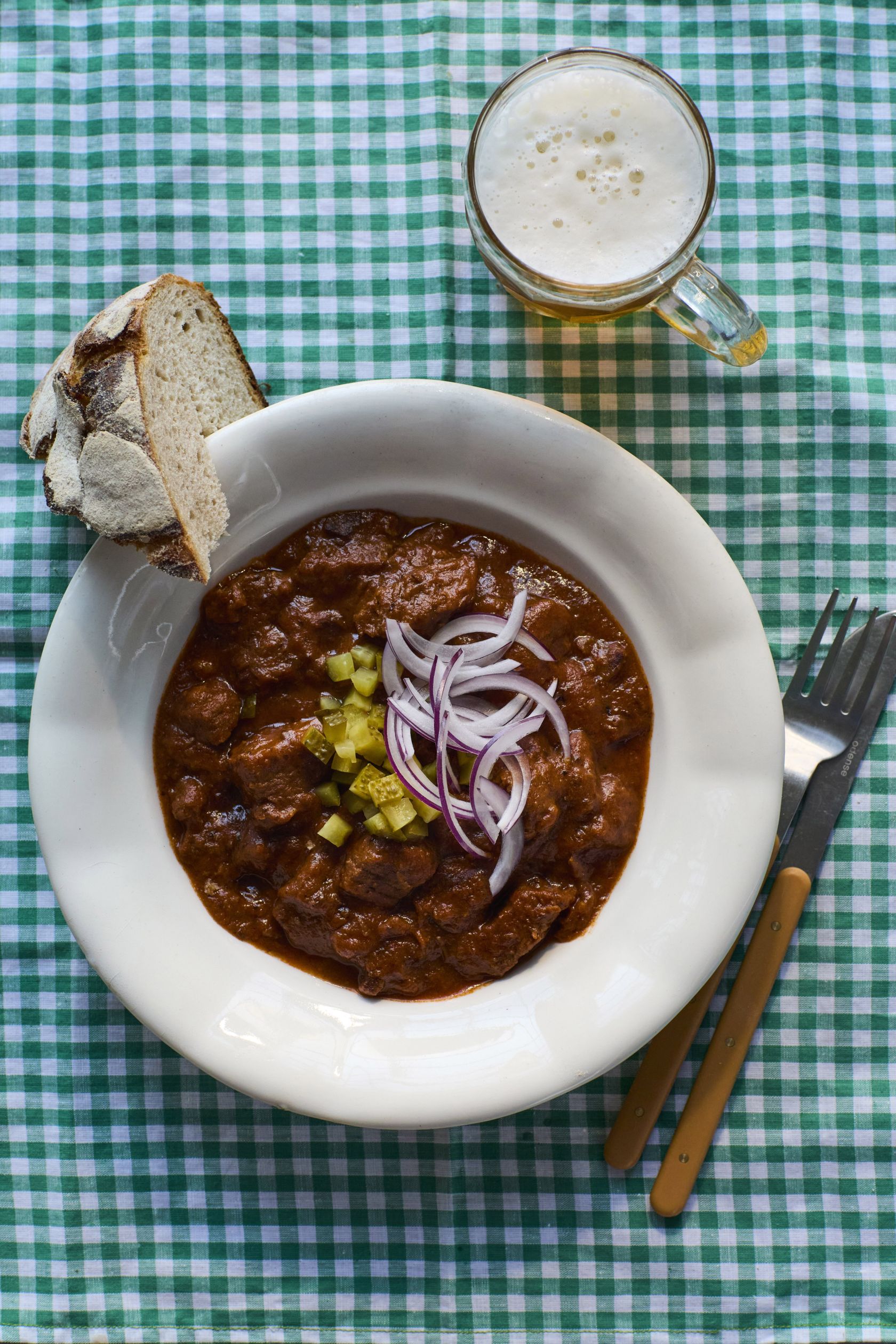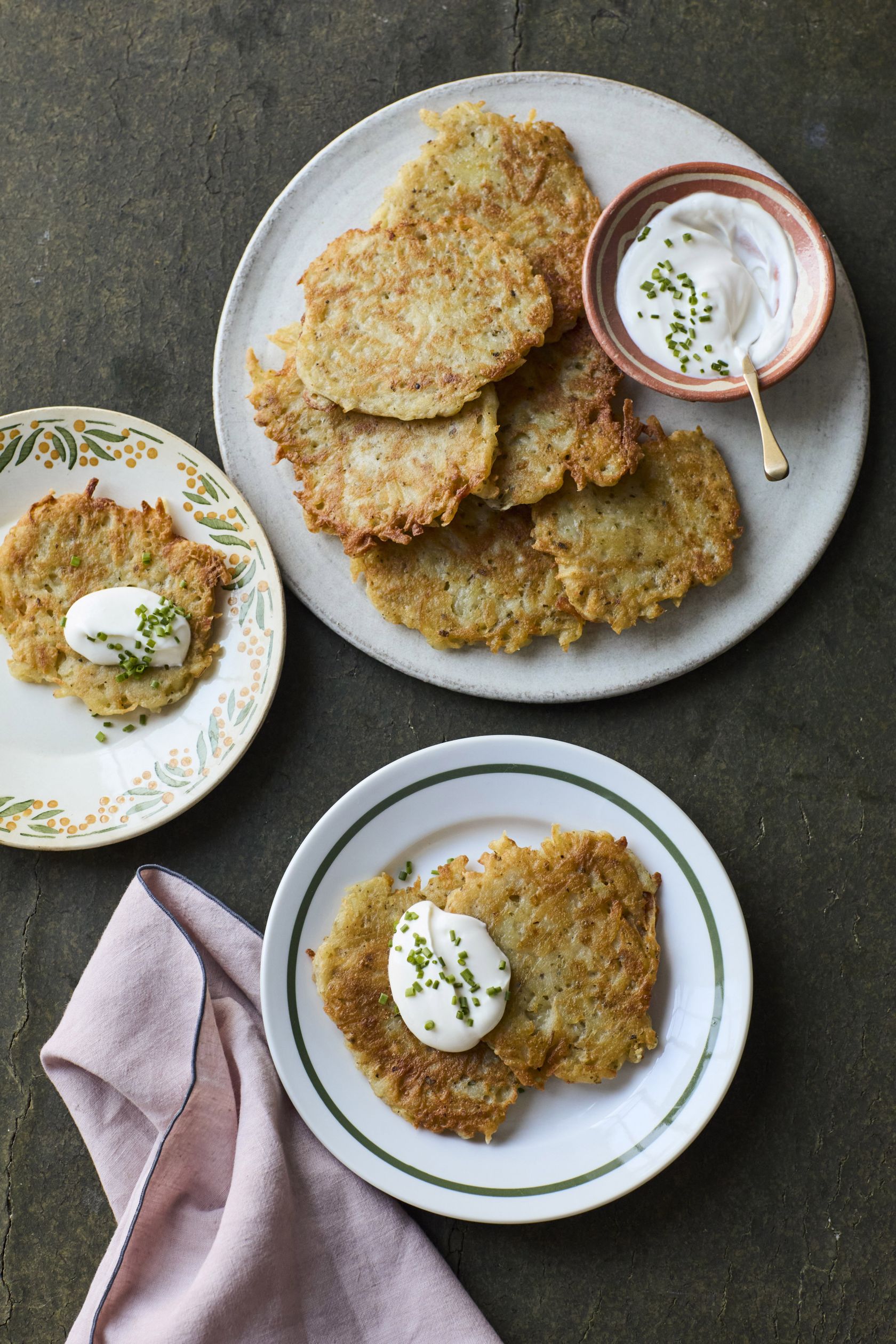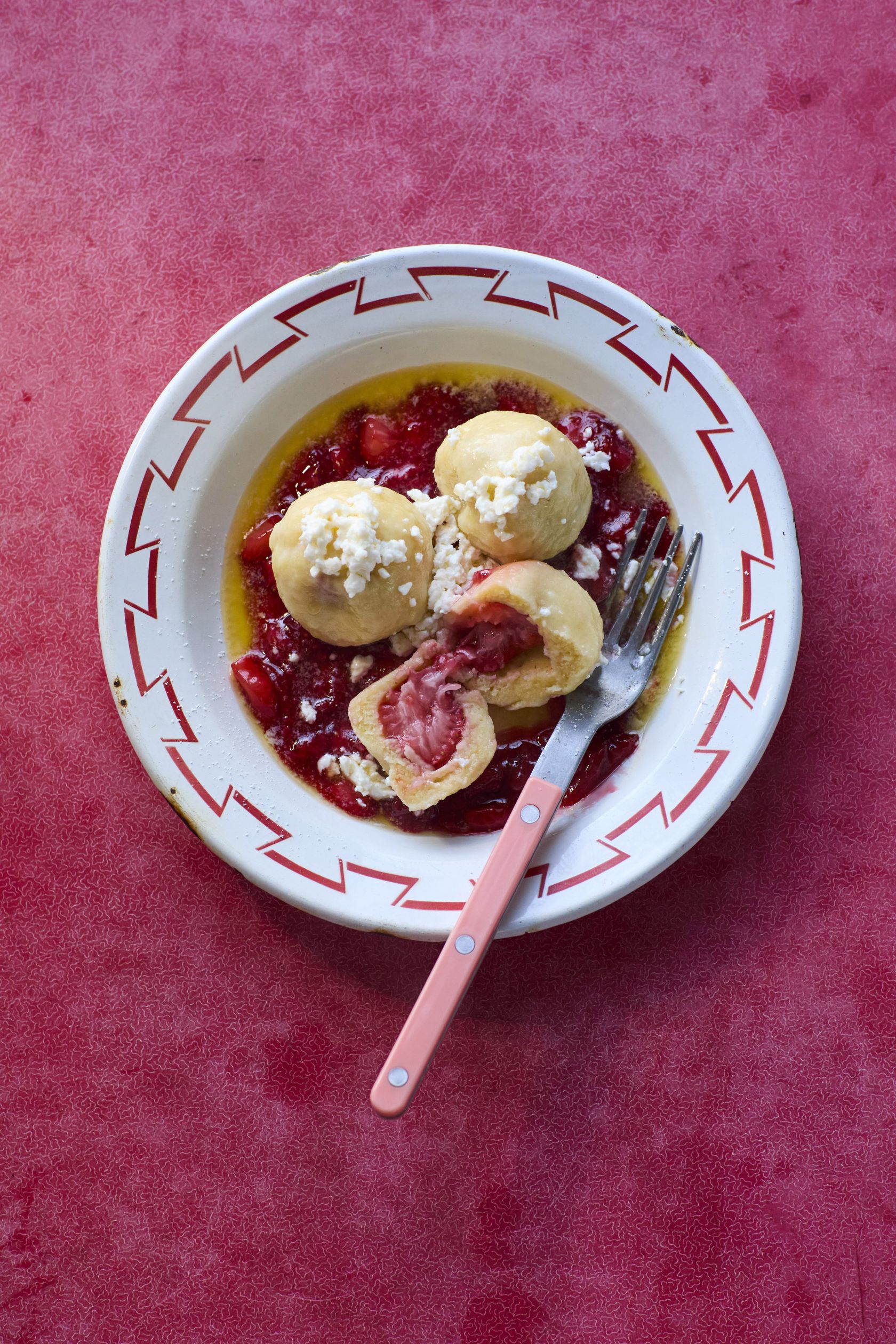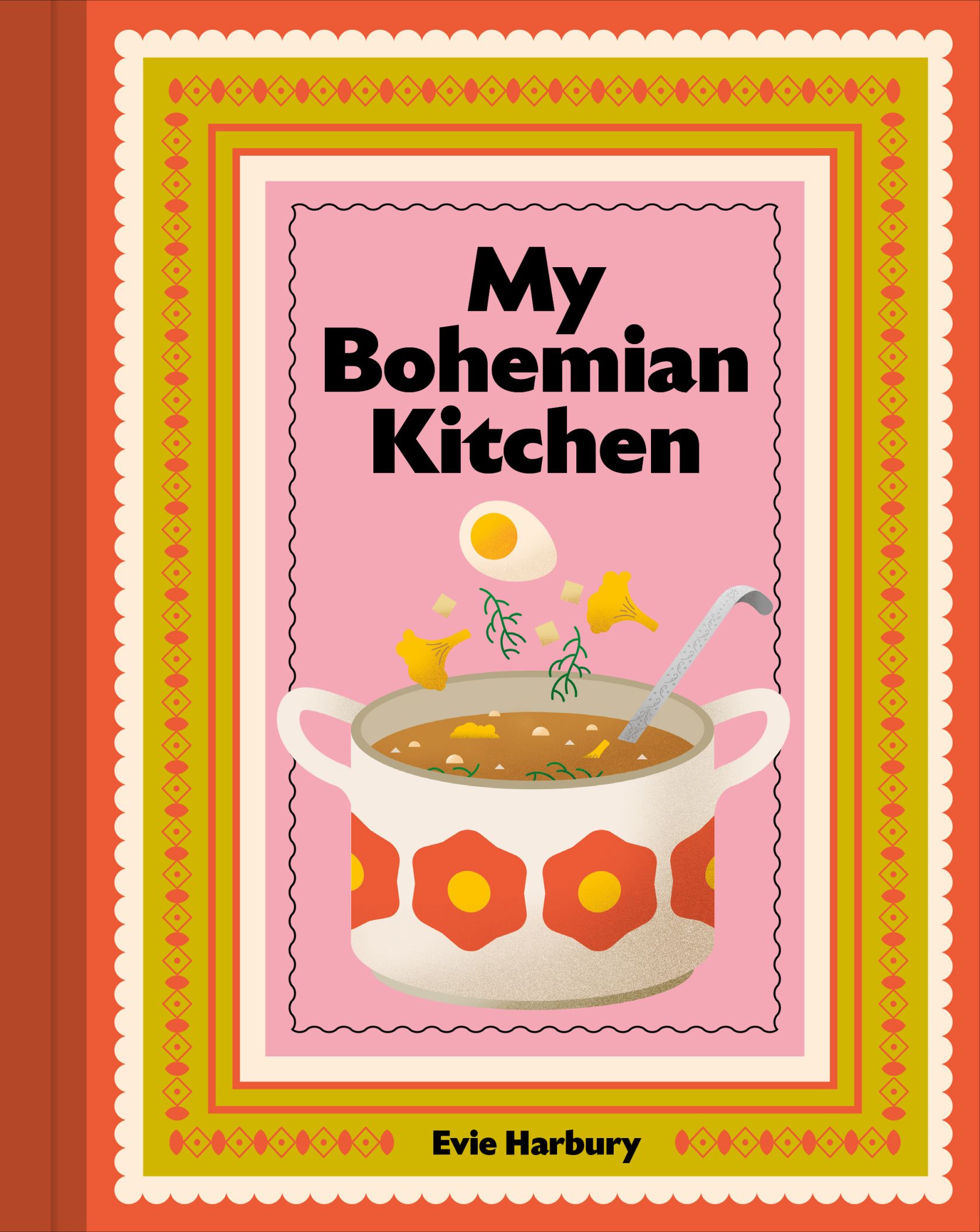Czechia, or the Czech Republic, is probably best known for its capital Prague, but its food has gone a little under the radar. “People sometimes can’t even place it on a map,” the 31-year-old notes.
Unlike many cuisines around the world, Czech food “hasn’t had its moment”, says Harbury. “When people go to the Czech Republic, they quite often go to just Prague and Prague is amazing, it has an amazing food scene, Vietnamese, Chinese, Indian, it’s got great Czech food in Prague – but there’s better Czech food outside of Prague. By not exploring, people often don’t actually know what it’s like.”
So Harbury – who started cooking 10 years ago after moving to Czechia and working in a kitchen there, before formally training at Le Cordon Bleu – is on a mission to spread the word about this “small, unassuming” country and its food with her debut cookbook, My Bohemian Kitchen.
Beef Goulash (Hovězí guláš)

Ingredients:
(Serves 4)
4tbsps lard (or 2tbsps unsalted butter and 2tbsps vegetable oil)
500g onions, finely chopped (prepped weight)
2 garlic cloves, chopped
2tbsps sweet paprika
1tbsp hot paprika
2tbsps tomato paste (concentrated purée)
1½tbsps plain flour
1tbsp vinegar (I use white wine vinegar)
1kg braising beef (such as chuck or shank)
3 scant tsps fine salt
1½tbsps dried marjoram
1tbsp caraway seeds, ground
(it’s best to buy seeds and then grind them yourself)
1tbsp caster (superfine) sugar (optional)
To serve:
Chopped pickled gherkins
Thinly sliced red onion (optional)
Sour cream (optional)
Bread dumplings or crusty bread
Method:
1. Heat the lard (or butter and oil) in a large casserole dish or saucepan over a medium–low heat. Add the onions and sweat down for 40 minutes to one hour, stirring regularly, until they are a beautiful caramel colour. The heat should be just high enough for you to hear a constant, very subtle sizzle.
2. Add the garlic and cook for a further two minutes, then add the paprikas, tomato paste and flour, and cook for 20 seconds more, stirring constantly.
3. Add 350 millilitres water, along with the vinegar. Bring to the boil, stirring constantly to avoid lumps, then remove from the heat and blend with a hand blender until completely smooth (or pour into a high-speed blender to blitz, then return to the pan).
4. Pat the beef dry, then cut into five centimetre cubes and season with the salt. Return the pan containing the onion mixture to a medium heat. Add the beef, marjoram and caraway, along with another 350 millilitres water. Partly cover with a lid, leaving some space for steam to escape. Bring to the boil, then reduce the heat to very low and simmer for two to two-and-a-half hours until the beef is tender.
5. Give the sauce a taste and add sugar, if you think it could be a touch sweeter. Sometimes the onions and tomato paste are sweet enough on their own, but this varies with each ingredient.
6. Enjoy the goulash hot, topped with chopped pickled gherkins, sliced red onion and sour cream, if you like. Eat with some bread dumplings or crusty bread rolls for a more casual approach.
Potato pancakes (Bramboráky)

Ingredients:
(Makes 12–14)
800g potatoes (Yukon Gold or Maris Piper), peeled and grated (not too finely)
3tbsps whole milk, warmed
1 medium egg, beaten
2 garlic cloves, crushed
2tsps sea salt flakes
2tsps dried marjoram
100g plain flour
Lard or vegetable oil, for frying
Freshly ground black pepper
To serve (optional):
Sour cream
Chopped chives
Crispy chilli oil
Method:
1. Tip the grated potatoes into a sieve and press down with your hands or a bowl to strain out any excess liquid they release. Do not wash off the starch, as this will be a key player in the texture of these pancakes.
2. Quickly transfer the strained potatoes into a large bowl, along with the warmed milk. Mix well; the milk will keep them from oxidising and turning a muddy brown colour. Add the egg, garlic, salt and marjoram, and season with black pepper. Stir well to evenly distribute the flavours.
3. Finally, stir through the flour until just combined. Heat a little lard or vegetable oil in a frying pan over a high heat. Once warm, reduce the heat to low and add a spoonful of the potato mixture. Use the back of the spoon to flatten it out and spread it to about 10 centimetres wide and five millimetres thick.
4. Repeat with a few more, taking care not to overcrowd the pan (you could use two frying pans at once to speed up the process). Cook the pancakes for four to five minutes on each side until evenly coloured. Do not be tempted to cook them at too high a heat, as the potato may not cook through.
5. Transfer the cooked pancakes to a plate lined with paper towels to drain any excess lard or oil, then repeat with the rest of the mixture, adding a little more lard or oil to the pan between each batch. You can keep the pancakes warm under a tea towel or reheat them in the oven if you are cooking in advance.
6. These are best served warm, and I love to eat them with a pinch of sea salt flakes, a dollop of sour cream, a scattering of chives and some crispy chilli oil. They’re also delicious just as they are, eaten with your hands as you wander around the garden or forest, embracing your inner child.
As a variation, or if you had some to use up, you could add sauerkraut to the mixture, or even some grated carrot.
Strawberry Dumplings (Jahodové knedlíky)

Ingredients:
(Serves 4)
350g cottage cheese or soft tvaroh (‘měkký’)
1 large egg, plus 1 yolk
200g semola flour or fine semolina, plus extra for rolling
12 strawberries, hulled
For the strawberry sauce:
250g strawberries, hulled and roughly chopped
50g icing sugar
To serve:
80g hard tvaroh (‘tvrdý’), crumbled (optional)
80g unsalted butter, melted
100g icing sugar
Method:
1. Press the cottage cheese or soft tvaroh through a sieve into a large bowl to purée it and remove any lumps. Add the egg and extra yolk and mix, then stir in the semola flour and mix again until fully combined.
2. Divide the dough into 12 equal-sized pieces and roll each piece into a little ball. Dust your hands with some semola flour. Take one of the dough balls and flatten it in the palm of your hand, then place a hulled strawberry in the centre.
3. Bring the dough together around the sides of the strawberry and roll into a ball to completely encase the strawberry. If you have a hole, don’t worry – you can just patch it up, as the dough is very forgiving. Place on a plate dusted with more semola flour to avoid sticking. Repeat with the remaining doughballs.
4. Bring a large pan of water to the boil. Carefully lower the dumplings into the pan and boil for seven to nine minutes (depending on the size of your strawberries), then drain.
5. Meanwhile, make the strawberry sauce by combining the chopped strawberries and icing sugar in a small saucepan over a medium heat. Cook for a couple of minutes until the strawberries begin to break down slightly (this will take two to three minutes longer if the strawberries are less ripe). Keep warm until you’re ready to serve.
6. To serve, divide the strawberry sauce between four bowls, then place three dumplings in each one. Top with crumbled hard tvaroh, if using, then drizzle the melted butter on top and finish with dusting of icing sugar.
These dumplings can be filled with different fruit in different seasons. Blueberries, plums and apricots are all delicious inside dough.

My Bohemian Kitchen by Evie Harbury is published by Murdoch Books















